- Home
- Bruce Sterling
Zeitgeist Page 7
Zeitgeist Read online
Page 7
“Why give me these clichés? You’re not being serious with me. A man of your abilities could matter. You could change the destiny of this unhappy world.”
“That’s just not my angle, man. We got the act started on a bar bet in Guam … got it incorporated in a brassplate front in Panama.… No, the act’s not important. I admit it, it’s a scam. But you know something? I like the work. I enjoy it. We make platform shoes in Shenzhen. We sell glitter tube-tops in Turkmenistan through the Nakhichevan Corridor. I like making those connections. I enjoy running the network. It suits me. I don’t ask for much else.”
“What kind of man are you, anyway?” Ozbey said mournfully. “What do you call yourself?”
“Well, man, if I had to pick just one term, I think I’m best described as a ‘systems analyst.’ ”
Ozbey emptied his martini glass and held it out to an eager flunky. “All right, let’s talk business, if you must talk business. This is our business: you could do much, much better with this act than you are doing. For all your business talk, you are not very efficient. You run your act like a silly private joke. You don’t make all the money that we could make. You don’t move all the goods that we could move. I worry about you, Starlitz. I worry that you don’t take our bargain seriously.”
“Why do you say that, man?”
“Why did you fire the American One? Why did you throw her out of the hotel tonight? She was central to the G-7 act! Everyone looks at her! Because she’s the American One!”
“I can get us another American One.”
“In three days? How can that be? Do you have a girl in your pocket?”
“I’ll hire another American girl. That demographic bracket has fourteen million women.”
“Not here in Turkish Cyprus.”
“Well, I got very good instincts in finding personnel.”
Ozbey rolled his eyes in contempt. “Why don’t you put Gonca in the act? Gonca knows the G-7 dance moves. You could dub her voice in English.”
“The gig doesn’t work that way.”
“Make it work that way.”
“Sorry. It’s not possible.”
Ozbey sighed. “I want to see Gonca happy. If only for a little bit. One day. Maybe two days. When she is happy, she is very generous with me.”
“Mehmet, you’re an ace guy, and I get it with the romantic problems. But don’t tell me how to manage my act. You don’t see me complaining about your end of the deal. Like, say, your setup with the local casino owner. That guy’s seeing double and his knees are shaking.”
Ozbey’s handsome face darkened. “Did Turgut Altimbasak complain to you?”
“I wouldn’t call that ‘complaining.’ I would describe it as ‘panic-stricken begging.’ ”
“Mr. Altimbasak’s stupid stubbornness has been interfering with the affairs of my Uncle the Minister.”
“Mehmet, I don’t need any explanations. You don’t owe me that, and I don’t even care. That’s your end of the deal. PKK, MHP, that’s a Turkish internal affair, not my problem. I wouldn’t pry, okay? I wouldn’t be that discourteous.”
Ozbey digested this, glowering. At last he spoke up. “You’ll have the act in Istanbul, ready to go onstage?”
“That was our deal, man. If I fall down on my end, you’ll be the first to know. I appreciate your investment. You’ve put a lot of effort into this. I want to see you as happy as I can reasonably make you.”
Ozbey was not taking this at all well, but he was taking it. “It doesn’t matter. It’s not allowed to matter. It’s all over in the year 2000, anyway.”
“Exactly. You could hold your breath, and get there from here.”
“Very well,” said Ozbey somberly. “For you I will hold my breath.”
AT HALF PAST ONE IN THE MORNING STARLITZ stepped out on his third-floor balcony, ripped open a pack of red Dunhills, and lit a cigarette. If he smoked outside his room, it was almost as if he weren’t smoking at all.
After the second lingering puff, dormant centers of addiction leapt to juicy life in the inner depths of his skull. Starlitz slid a little sideways, the brown study of the drug throwing a new cast over his difficult night. He scratched at his bulging, hairy belly as he stared over the empty parking lot.
He hadn’t gotten it about the singer/actress. He hadn’t made himself fully open to the scary depths of narrative vitality there. G-7 was supposed to slide right through Turkey. The whole Turkish scene was supposed to be extremely meaningless and temporary. If the situation somehow stalled, the consequences could become extreme.
A taxi arrived and pulled up below him. The driver flung his door open, scrambled out, fled headlong across the parking lot, and crashed through a line of oleanders. He vanished, stumbling, into the shadowed, treacherous mess of a seaside construction site.
Starlitz tossed the cig, grabbed a shirt, and headed downstairs.
The Cypriot taxi was still parked, its motor running. Starlitz peered warily into the backseat. Sprawled limply across the backseat was a large plastic garbage bag. The big gray bag had the wrinkled, fetid, overstuffed look of a torso murder. It was topped with a pair of broken sunglasses and soled with rotten tennis shoes.
Starlitz yanked the taxi door open, grabbed the bag, and shook it violently. “What is with you? Get a grip! You’re scaring the straights.”
“She didn’t make it,” the trash bag muttered. It began to sob bitterly.
“What the hell happened?”
The trash bag lifted one gray wrinkled arm, found its shattered sunglasses, and placed them onto its slack, shriveled face. The apparition flexed and wriggled somehow, into a better light. It became apparent that it was Wiesel the paparazzo. Wiesel was a shadow of his former self.
Wiesel groaned in anguish, his voice like a distant, desolate wind. “I took her to that Turkish bath. They cleaned her! They cleaned her all up!”
“Who? What?”
“Princess Diana. She’s in the trunk.”
Starlitz gripped the taxi driver’s dangling keys and shut off the engine. Then he circled the vehicle and carefully opened its trunk. An unspeakable stench roiled forth, the sickly, funereal reek of an entire nation’s worth of dead roses.
Amid Wiesel’s heaped-up camera gear Starlitz found the kitsch little tomb of the Princess. She’d been stuffed inside a little suitcase, like a hat case for a grown-up doll. Starlitz touched the slick plastic handle and snatched his hand back, fingers tingling. He swore quietly.
“It was fucking stupid to do this!” Starlitz said, moving to the open door again. “What did you do, check her onto a plane?”
“Yeah.” Wiesel groaned.
“And she got through the security scan? I can’t believe this.…”
Wiesel wrinkled his empty, paperlike forehead. He began to sob again, his rib cage rustling audibly.
Starlitz absently flipped the driver’s keys over thumb and forefinger, like a set of worry beads. This was a very bad scene. He hadn’t seen one this intense in quite a while. “Too bad,” he said at last. “Shit happens.”
Wiesel pulled his broomstick legs from the back of the taxi seat and dropped his rotting rubber shoes, one-two, onto the hotel’s tarmac. “She died so happy,” he mourned. “You should have seen her smile! Like she just … faded. My little angel … God, the camera loved her so much!”
“I knew she’d never make it through Y2K,” Starlitz said slowly. “I didn’t say anything to you … but I mean, how could she? How the hell could she?”
“I always tried to keep her out of fast cars,” Wiesel confessed in anguish. “And Paris. I never took her to Paris, ever.”
“Look, you can’t blame yourself, man. Sometimes the narrative just shuts down, you know? There’s no sequel possible. You can’t extend the franchise.”
“I know that,” Wiesel said in black despair. “It’s Y2K, boyo. It’s that bleedin’ glass wall.…”
“Well, then.”
“I’m not gonna make it either.”
&nbs
p; “The fuck you talking about? Of course you’re gonna make it! The next century, that’s gonna be the golden age of surveillance. You’re much better off without her, man. After Y2K you’re finally coming into your own.”
“No, that isn’t true. This isn’t my time anymore. It’s not my wonderful time. Me and the scooter boys, back on the Via Veneto … When a paparazzo took a picture back in the sixties, we wanted to take a damn picture! The public wanted to see the pic! There was stars then, there was faces, there was”— Wiesel drew a tortured breath—“there was desire. If you ever saw a candid photo in the ’bloids, somebody wanted that picture, somebody had to take it.… But it’s all about machines now. It’s all bleedin’ automatic.”
Starlitz was silent. He had no ready counter for this assertion. There was no workaround for it. Wiesel was dead right. It was one of those two-in-the-morning, midnight-of-the-soul things.
“Well,” Starlitz barked at last, “what the fuck are you doing here, then? Why didn’t you just stay in Istanbul? What are you doing in this cheap-ass Cyprus casino? I’m trying to get some goddamn business done around here!”
“I need to put the Princess to rest. Because … at the end of the day … I was all she had.”
“In your condition? You’re a fuckin’ specter! How’d you let yourself get this bad, anyway? It’s not professional.”
Wiesel laughed hollowly. “Just get me on my feet, Leggy. Put her in my arms.” Wiesel was stirring now, bracing himself with his last foul dregs of initiative. “Point me to the no-man’s-land. The Cyprus Green Line, between the Greeks and Turks. So many lovely flowers there, behind the barbed wire. There’s constant UN surveillance … it’s perfect for the two of us.”
“Look, you can’t do that. What about your equipment?”
“You keep it. I’m so tired, Leggy. I’m sick of myself. I swear I’m ready—I want it to be over.”
“Look, man, you’re not over. She is over. All you need is a new assignment.”
“I tell you I’m sick of the whole world. I’m sick to death.”
Wiesel leaned suddenly over his skeleton knees. His death-pale face ripped open, like a slit in a taut bedsheet. Money vomited out of his mouth.
First came a dense, choking wad of sepia-colored Turkish lira. Wiesel spat the cash onto the pavement, drew a desperate breath, and violently heaved up a wet torrent of British pounds.
Starlitz looked around himself. This was a crisis: Wiesel was going down hard. The situation seemed hopeless. Only a sudden, dramatic intervention could save them now.
Greatly to his own surprise, Viktor Bilibin suddenly manifested himself in the hotel’s bushes. “Mother of God,” Viktor said in Russian, numbly trying to zip up his jeans. “Where is my room? Where’s my toilet?”
“Get over here,” Starlitz commanded him in Russian. “Put down that vodka.”
“This is not vodka,” Viktor said reasonably, staggering out of the vegetation and brandishing his bottle. “It’s Cyprus brandy. It’s very good.”
“My friend has had too much tonight, Viktor,” Starlitz crooned, the voice of clear and lucid reason. “So now you’re going to help us with his luggage.”
“Okay,” said Viktor, staggering over. He casually set his brandy bottle on the roof of the cab.
Wiesel grasped at the taxi’s door frame with tormented, skeletal fingers. He heaved, retched, and blew a foul torrent of deutsche marks over Viktor’s Nike-clad feet.
“He’s badly off,” said Viktor agreeably. He gripped Wiesel’s hollow shoulder and levered him up with one hand. “Come on, old man. Don’t bend over when you puke. You can choke to death that way. Come on, up on your feet.” He heaved Wiesel out of the car. “Walk! Walk it off, you can do it.”
Viktor tugged Wiesel’s entire limp body-husk over his own shoulder, as if trying on an overcoat. “He smells like a whorehouse,” Viktor complained. “What’s he been drinking, eau de cologne?”
“Something spilled inside the trunk,” Starlitz said. “Have you got a good grip on him there? I’m gonna fetch all his camera gear.”
“It’s all right,” Viktor assured him, “it’s not the first time that I’ve done this.”
A Meridien Casino bellhop belatedly appeared. “Is it all right?” he said in halting English.
“He’s drunk,” said Viktor calmly. He kicked at the wet cash on the tarmac. “The taxi driver left. Can you do something about this dirty money here?”
The bellhop gazed at the pavement. His attention was suddenly riveted. “Oh, yes,” he said. “Of course.”
Starlitz tucked the yellow case into the bellhop’s slack hand. “Could you hold this case in the checkroom for me? Mr. Starlitz, in room 301.”
“Of course, Mr. Starlip.”
Starlitz slung a tripod over his back.
They entered the Meridien’s lobby through the sliding double glass doors. “Where do you want him?” said Viktor, expertly shuffling the unconscious paparazzo.
“Let’s put him inside the elevator.”
Viktor plucked a stray twenty-dollar bill from Wiesel’s slack lips, wiped the photographer’s mouth with it, and tucked it fastidiously into Wiesel’s gray raincoat. The elevator opened promptly, and the three of them staggered inside.
Starlitz pressed a button for the penthouse.
The elevator rose. “Did you ever read Pelevin?” said Viktor conversationally, flopping Wiesel against the mirrored wall and propping him there with one elbow.
“Should I?”
“Pelevin’s from Moscow. He wrote Omon Ra and The Yellow Arrow.”
Starlitz nodded helpfully.
“I mention that,” said Viktor thoughtfully, “because this is a very Pelevin-like moment.”
Starlitz scratched at his head as they cleared the sixth floor. “Is Khoklov around anywhere?”
“I don’t know. I don’t think so.”
“Your uncle hasn’t been drinking, has he?”
“You said that we could drink in the evenings,” Viktor pointed out.
The elevator opened with a wheeze. The casino’s penthouse landing was lushly carpeted and lined with fine blue-and-white Turkish tiles.
“Your friendly Turks don’t like me very much,” said Viktor.
“Just pretend you don’t speak any language they can understand,” Starlitz told him. “You can get away with anything then.”
Ozbey’s pet thug Drey was standing guard at the penthouse door, but Drey recognized Starlitz, and let the three of them in. Ozbey and his entourage were enjoying a little after-hours party. The air was thick with blue cigar smoke, and someone had put on a Tony Bennett album.
“Here, let me take him,” Starlitz told Viktor. He propped the photographer’s dead-eyed husk against the striped wallpaper. “Dig in that Nikon bag on my back, and gimme his thirty-five-millimeter.”
Viktor did as he was told. Then Ozbey appeared, toting a demitasse and puffing a cigarillo.
“What happened?” Ozbey said, eyeing Wiesel skeptically.
“This is Mr. Wiesel from the British Vogue,” Starlitz said. “He’s a fashion photographer.”
“Is he dead?” said Ozbey with interest.
“Rough flight from Istanbul,” Starlitz said. “He didn’t know there are no direct bookings to Turkish Cyprus. He kinda overdid it on his motion-sickness meds.” Starlitz glanced up. “You get the story?”
“It’s a shame about the flight embargoes here,” said Ozbey. “But he looks very dead.”
“Stop saying that,” Starlitz insisted. “I brought him into town to shoot your girlfriend. So I did you a favor, okay? So do you wanna see Gonca in a two-page spread, or do you want to keep her tucked inside your hat?”
Ozbey smiled in apology and gestured into the depths of the suite. “Well, she’s never looked prettier.”
“Get this man a mineral water,” Starlitz grumbled. “He’s jet-lagged to shit. Get him some dex or some coke. He’s up for it.”
“We’ll see what the boys have
down the hall.” Ozbey shrugged. Ozbey was bored now, so he vanished.
“Look, this isn’t going to work,” Viktor hissed. “Because he’s dead.”
“Shut up, kid.”
“Here’s an empty liquor box,” the young Russian said alertly. “Let’s just crumple him up, and stick him inside it.”
“Give me his goddamn camera,” Starlitz insisted. He had spotted Gonca in a crowd of men across the room. She had accumulated a little claque of politicians and a couple of awestruck radio guys; Gonca was laughing, with her chin up and her throat vibrating like a nightingale’s. She paused to tear coquettishly into a salmon-colored cube of Turkish delight.
Starlitz adjusted the focus. Then he squeezed Wiesel’s papery mitts onto the camera and lifted the machine to his face.
A soft moan emerged from behind the lens.
Starlitz pried the camera away, just a bit. “She’s hot,” he confided. “Go ahead, man, look.”
Starlitz lifted the Nikon again, like a nurse lifting a mug of warm cocoa to the lips of an avalanche victim.
Rapid clicks emerged from the camera.
Wiesel’s spine straightened suddenly. He peeled from the hotel wall like an origami trick.
“C’mon baby,” Wiesel whimpered. “Give!”
Viktor gazed at Wiesel nonplussed. He leaned in as Wiesel’s desolate face filled out with a sudden flush of health.
Wiesel gave the Russian a swift stiff-arm. “Get out of the shot, punk!”
Viktor staggered back with a surly knitting of the brows. Wiesel fired off the last of the roll and reached into his pockets reflexively. His hands came up empty. He gave a hiss of anguished need.
Starlitz quickly handed him a plastic film canister, without a word. Wiesel champagne-popped the cap with an instant stab of his thumbnail, then locked-and-loaded the film. Starlitz gazed across the suite at the actress. Gonca had fallen silent suddenly. She was still unaware of them, but a puzzled, thoughtful look had touched her radiant brow.
Wiesel sidled along the wall behind a hatstand, took a shooter’s stance, lifted his machine, and began absorbing images. Gonca, lost for a moment, reached for a cigarette. She lit up with trembling hands, and bit her lip.

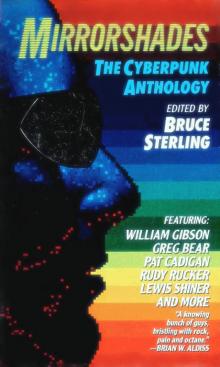 Mirrorshades: The Cyberpunk Anthology
Mirrorshades: The Cyberpunk Anthology The Wonderful Power of Storytelling
The Wonderful Power of Storytelling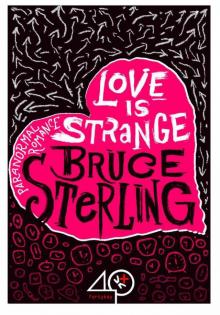 Love Is Strange (A Paranormal Romance)
Love Is Strange (A Paranormal Romance)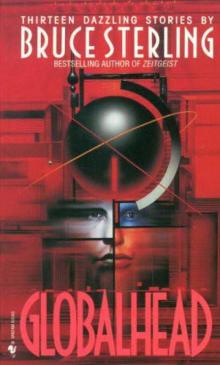 Globalhead
Globalhead Essays. FSF Columns
Essays. FSF Columns The Hacker Crackdown
The Hacker Crackdown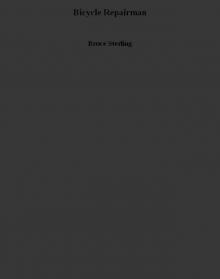 Bicycle Repairman
Bicycle Repairman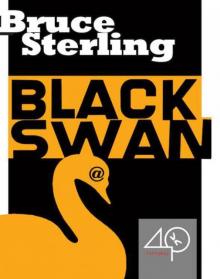 Black Swan
Black Swan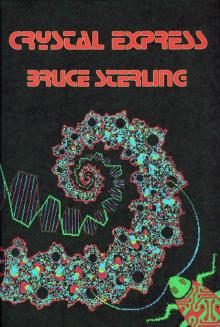 Crystal Express
Crystal Express Islands in the Net
Islands in the Net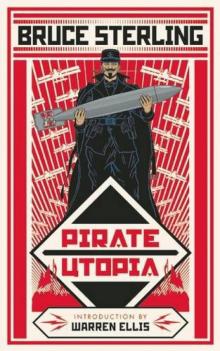 Pirate Utopia
Pirate Utopia GURPS' LABOUR LOST
GURPS' LABOUR LOST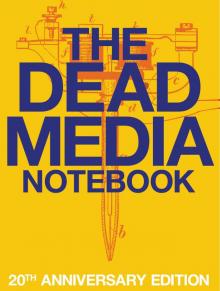 The Dead Media Notebook
The Dead Media Notebook Unstable Networks
Unstable Networks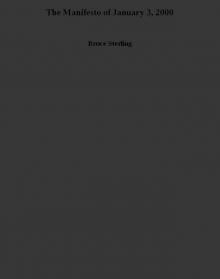 The Manifesto of January 3, 2000
The Manifesto of January 3, 2000 Heavy Weather
Heavy Weather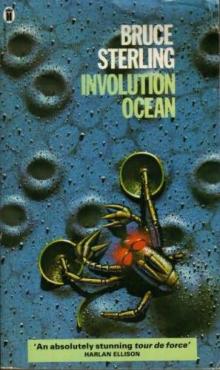 Involution Ocean
Involution Ocean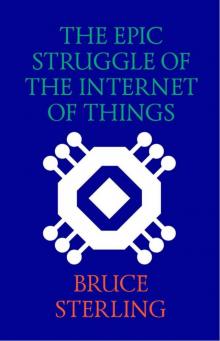 The Epic Struggle of the Internet of Things
The Epic Struggle of the Internet of Things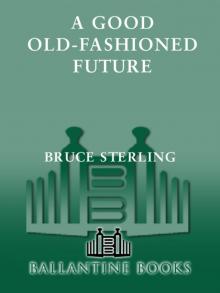 A Good Old-Fashioned Future
A Good Old-Fashioned Future The Littlest Jackal
The Littlest Jackal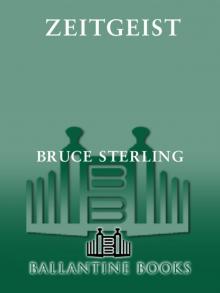 Zeitgeist
Zeitgeist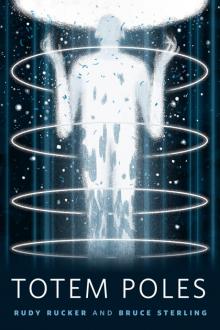 Totem Poles
Totem Poles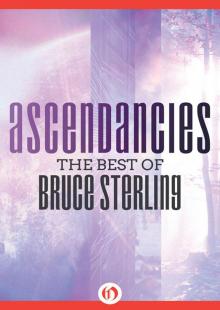 Ascendancies
Ascendancies CyberView 1991
CyberView 1991 War Is Virtual Hell
War Is Virtual Hell Taklamakan
Taklamakan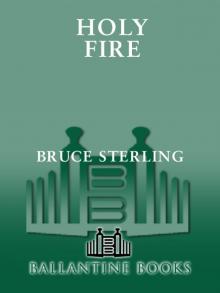 Holy Fire
Holy Fire Cyberpunk in the Nineties
Cyberpunk in the Nineties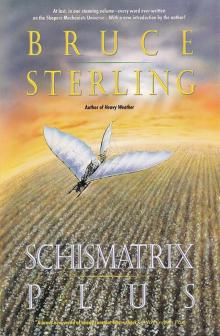 Schismatrix Plus
Schismatrix Plus The Artificial Kid
The Artificial Kid Essays. Catscan Columns
Essays. Catscan Columns Maneki Neko
Maneki Neko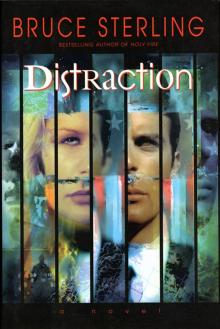 Distraction
Distraction In Paradise
In Paradise Red Star, Winter Orbit
Red Star, Winter Orbit Luciferase
Luciferase